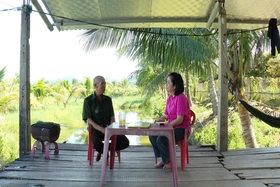{title}
{publish}
{head}
For generations, the people of Khe Sanh have shared stories of a remarkable Frenchman who introduced coffee to the region in the 1920s. His name was Eugène Poilane, a botanist whose early plantings laid the groundwork for what would become the famed Khe Sanh coffee
Khe Sanh will celebrate 100 years of coffee cultivation in 2026. In search of the roots of this legacy, I set out to trace Eugène Poilane’s footsteps to understand what compelled a Frenchman to dedicate his life to this remote highland and why he now rests beneath its hills and forests.
My journey began on a misty morning by Khe Sanh Lake, near what locals said was once his plantation. No house remains, no drying yard, only fragments of memories recalled by those who have spent a lifetime on these coffee hills.

Eugène Poilane (1888–1964), a French botanist and the first to plant coffee in Khe Sanh
I visited Le Thi Em, now in her 90s, one of the last living witnesses to the story of Poilane’s grave. She recalled that years ago, during a road expansion project, his original burial site was accidentally unearthed. Her grandson, Vo Van Chuong, carefully gathered the remains and reburied him near a bamboo grove behind their home.
Following her directions, I made my way to the grove. Bamboo leaves whispered in the breeze above a modest, ground-level grave outlined by a simple ring of bricks. Nearby, an old ceramic vase and a small dish offered quiet signs that someone still remembers. The once-renowned botanist now rests here, in peaceful seclusion.
I then sought out Ho Thi Luu, Chuong’s wife, who runs a modest refreshment stall by the lake. When I asked about the reburial, she quietly unlocked her phone and showed me three photos. In each image, a ceramic jar cradled a few bone fragments and an almost intact set of false teeth, several gold-capped molars faintly catching the light. Time had distilled a remarkable life into these delicate remains.
Luu revealed that her husband’s grandfather, Vo Van Thuong, had handwritten an account of Poilane’s life. She offered to take me to see him.

Vo Van Thuong (right), a living witness to Eugène Poilane’s life and the century-long history of Khe Sanh coffee. Photo: Le Canh Oanh
I found Thuong, now nearly ninety but still sharp and strong-voiced. He spoke with remarkable clarity, recounting the past in vivid detail. Back in 1926, he said, Poilane built a long house, about 80 meters in length, beside the Khe Sanh Bridge, with a stream flowing just behind it. The hillside above Mrs. Em’s house, now covered in newer growth, was once Poilane’s coffee drying yard and storage barn.
According to Thuong, Poilane had three wives. The first was a Frenchwoman named Yvonne. The second, named Ba, was from iĩnh Linh. The third, Dang Thi Nam, belonged to the Tay ethnic group. Many of Poilane’s children, he added, either perished during the war or were lost when the country was divided.
When he spoke of Poilane’s death, his voice grew somber. He recalled that in 1964, Poilane was shot while driving his yellow Citroën along Route 9, likely mistaken for an American. At the time, Thuong was in his late twenties and joined the funeral procession. He remembered that the coffin was made with two layers, wood on the outside and tin inside, and Poilane was buried close to his home.
After reunification, his children returned to search for the grave but could not locate it. It was only last year that two of his grandchildren came back and offered incense at the bamboo grove where he now rests.
From Thuong’s vivid recollections, I turned to French and American records to learn more. The well-regarded academic platform OpenEdition Journals, for instance, featured two studies in its 2021 issue of Revue d’ethnoécologie. Both works explore Eugène Poilane’s life and examine the social and ecological conditions of Vietnam’s mangrove forests, drawing heavily from his field notes.
Poilane was born in 1888 in a rural part of France, into a poor farming family. Eager for adventure, he joined the military at the age of nineteen and served in a colonial artillery unit stationed in Toulon before being sent to Cochinchina. In 1918, by a twist of fate, he crossed paths with Auguste Chevalier, a renowned botanist, at the Saigon Botanical Garden. Recognizing Poilane’s keen eye for plants and nature, Chevalier helped him secure a position at the Saigon Scientific Institute.
From then on, Poilane traveled extensively throughout Vietnam, Laos, and Cambodia, collecting thousands of plant and fungus specimens for the National Museum of Natural History in Paris. He first set foot in Khe Sanh in 1918 and fell in love with the red basalt soil, likening it to Tuscany’s famed vineyards. In 1926, he returned with Chiari coffee seeds, planting the first bushes that would eventually spread across these misty hills, providing livelihoods for generations.
His lifelong dedication resulted in over fifty thousand preserved specimens, detailed field notebooks, unfinished memoirs, and a rich collection of letters exchanged with other researchers. In one of his notes, he wrote that he no longer considered himself French but rather a man of Indochina. He also revealed a wish to be buried standing upright on a mountain in Khe Sanh, so he could remain part of the land he loved.
I spoke with Nguyen Canh Binh, Chairman of Alpha Books, about the possibility of translating Poilane’s manuscripts into Vietnamese. He was enthusiastic and pledged to negotiate with the French museum to bring these hidden pages home, so that Vietnamese readers could better appreciate the man who sowed the seeds of Khe Sanh coffee.
A hundred years have passed. The hills of Khe Sanh continue to yield fragrant beans that carry the scent of mountain mists and the spirit of those who tend them. The province is working to secure a geographical indication for Khe Sanh coffee, preserving its authentic taste true to Poilane’s original vision.
In 2026, Quang Tri will host the second Peace Festival, which will also mark the centenary of Khe Sanh coffee. Locals hope to honor both nature and the man who cherished it so deeply.
Poilane once wrote, “Catholics believe in a named deity, but I worship a force I call Mother Nature.”
Perhaps this is why his story resonates so strongly today. Among the rows of coffee trees stretching to the horizon, the simple yet profound message lives on: Brew coffee, not conflict.
A century has passed, yet the story of Khe Sanh coffee and the quiet grave of Eugène Poilane remain deeply connected, reminding future generations of what can flourish when both seeds and good intentions are planted with care.
Nguyen Hoan - Tung Lam

QTO - Not letting summer slip by in vain, many students in Quang Tri have taken the initiative to teach English to younger children. Through each lesson,...

QTO - Returning from the northern border front with a 2/4 disability, it seemed his journey of service had come to an end. Yet, this wounded soldier began...